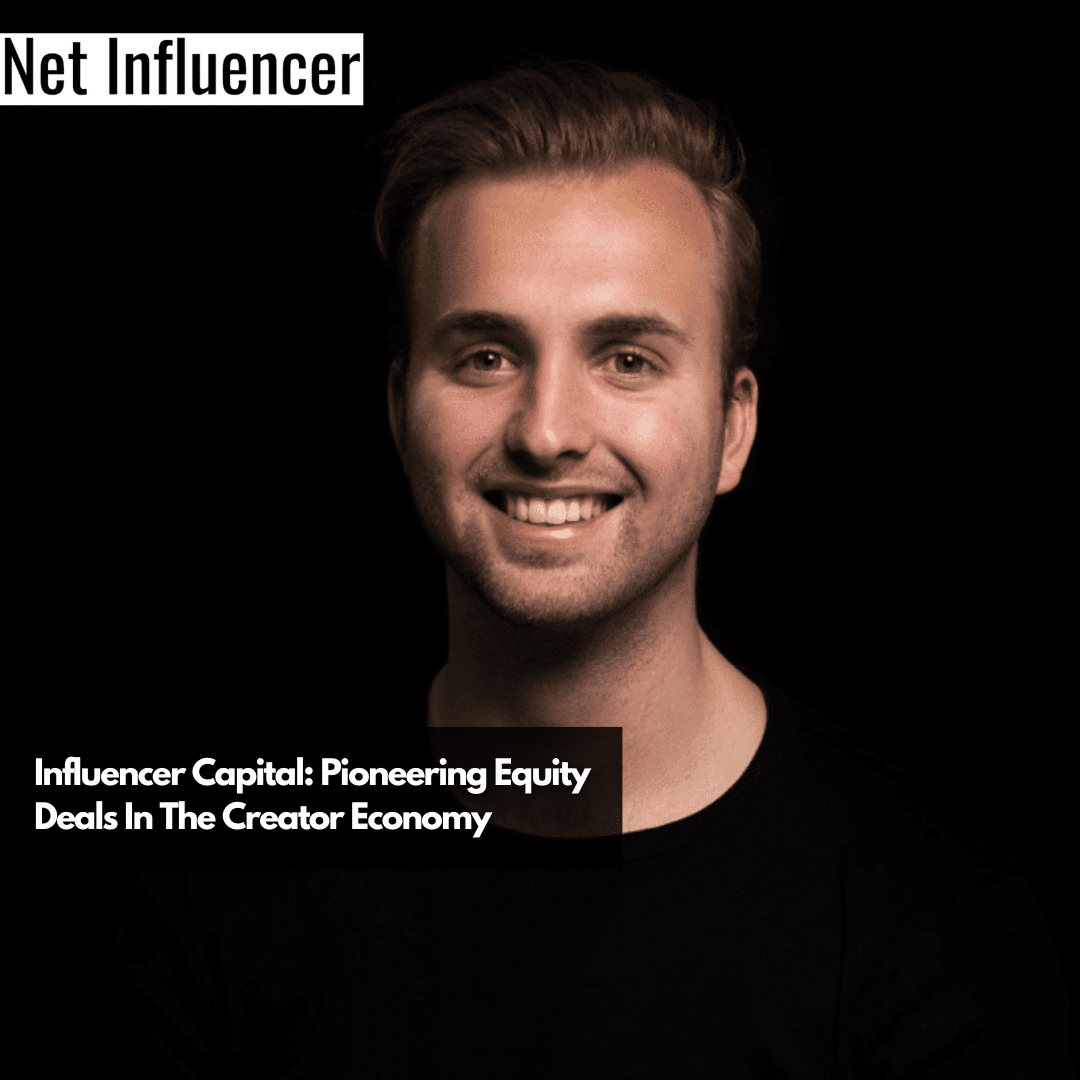Agency
Influencer Capital: Pioneering Equity Deals In The Creator Economy

Scott Van den Berg, founder of Influencer Capital, is at the forefront of a pioneering venture in the creator economy. From his base in Amsterdam, he leads an organization that’s breaking new ground. Influencer Capital, established at the tail end of 2021, isn’t just another startup; it’s a bridge between the worlds of business and social influence.
“We’re structuring equity deals between startups and influential personalities,” Scott explains. “This approach allows startups to collaborate with leading influencers without the immediate financial burden. Conversely, it offers these influencers a stake in the company they help to flourish.”
The concept is innovative, a testament to Scott’s vision. Influencer Capital has attracted significant interest, amassing an initial $350,000.00 from strategic investors. These aren’t just any investors; they bring with them a wealth of experience and connections. Among them are two seasoned talent managers, each boasting over two decades of experience handling high-profile celebrities and creators.
Another key player in their investment circle is Kaj Gorgels, a prominent Dutch influencer, who offers invaluable insights from an influencer’s perspective. “These strategic partners, though not officially employees, are integral to our team,” Scott says, hinting at the collaborative ethos at the heart of Influencer Capital. “In essence, we’re a team of four, each bringing a unique dimension to our venture.”
Scott Van den Berg: From Investment Banking to Influencer Equity
Scott’s roots in investment banking, where he specialized in connecting European startups with U.S. investors, laid the groundwork for his future endeavors. “We were successful, aiding 14 European startups,” Scott recalls. “But a recurring frustration was witnessing these companies later raise millions, sometimes billions, while we settled for a mere consulting fee.”
This realization sparked a pivotal shift in his career. “The thought struck me,” he says, “how much more beneficial it would have been to have a small equity stake in these companies instead.” This epiphany led Scott to exit his investment banking firm, driven by a new goal: earning equity in companies by contributing to their growth.
“Entering the creator economy was a fresh experience for me,” he admits. This transition had its advantages and challenges. “While I brought a new perspective, I lacked specific experience and a network in this industry,” he explains. To bridge this gap, Scott strategically involved experienced advisors and investors, including talent managers and influencers. “Their expertise and network significantly accelerated my growth,” he notes.
A pivotal move for Scott was deciding to become a creator himself. “Many were unaware of the equity model we advocate for, so I started creating content on LinkedIn about it,” he shares. This content, which included case studies and discussions about the benefits of the equity model for both startups and influencers, not only helped in spreading awareness but also brought him closer to potential collaborators. “It opened up conversations with startups, talent managers, and influencers interested in this model,” Scott reveals.
It was in this period of reflection that Scott noticed a parallel in the world of influencers and celebrities. “Like me, they were instrumental in scaling businesses but only received one-off payments, missing out on the exponential growth they helped create.” This was a critical insight, highlighting a gap in the market where influencers weren’t fully capitalizing on their impact.
Scott observed a handful of savvy celebrities and creators negotiating equity deals, a rarity at the time. “I searched for an organization specializing in this, but found none,” he shares. This gap in the market was the catalyst for Influencer Capital. “I decided to build the solution myself,” he states, marking the birth of a venture that would transform the relationship between influencers and startups.
“Our mission is twofold,” Scott explains. On one hand, Influencer Capital aims to revolutionize the way creators approach their careers. “We want to enable creators to build long-term, financially stable careers,” he says. This is achieved not through traditional means, but by helping them earn equity stakes in startups.
On the flip side, the vision for startups is equally transformative. “We’re here to help startups realize their potential, guiding them to become the next big names, the iconic household brands of the future,” Scott shares.
Equity Deals: A Triumphant Strategy for Creators and Brands
Scott emphasizes the substantial benefits influencers gain from equity in startups over traditional sponsorship deals. This shift represents a significant change in how influencers can secure their financial future and diversify their income.
“We’re allowing influencers to earn equity in the companies they help grow,” Scott explains. This approach enables them to share in the upside typically reserved for founders, investors, and employees. It’s a game-changer, moving beyond the conventional sponsorship model where influencers receive a one-time payment for their services.
One of the key advantages of this model, as Scott highlights, is the diversification of income. “The digital landscape is unpredictable,” he notes. “Platforms may decline, trends shift, and personal circumstances change. Equity stakes provide a safety net, creating long-term, sustainable income streams.”
Scott suggests a practical approach for influencers: balancing cash deals with equity-based partnerships. “Even allocating a small percentage, like 5%, of their deals to equity can have a profound impact,” he says.
For brands, the first and most immediate benefit, according to Scott, is marketing. “By entering into equity deals, startups can partner with the most recognizable faces in the industry,” he says. This partnership puts the startup in the spotlight, reaching a vast audience without the immediate financial strain. “Many startups dream of working with influential figures but are limited by their budgets. Equity deals provide a solution, enabling rapid scaling and visibility.”
The second benefit is the authenticity of the relationship. Traditional cash transactions for endorsements can often lack a genuine connection with the brand. “In an equity deal, influencers have a stake in the company’s success,” Scott points out. This means they are likely to engage only with brands they truly believe in. “This creates a more authentic relationship. The influencer’s endorsement comes from a place of real belief in the product or service, not just a paycheck.”
Lastly, Scott highlights the role of such partnerships in building credibility and opening doors to new opportunities. New startups often struggle with establishing trust. “Having a well-known personality endorse your product can add significant credibility,” he notes. This credibility extends to attracting media attention, aiding in fundraising, and forging strategic partnerships. “For example, if a beverage company partners with a celebrity, it can leverage this relationship to break into retail spaces like Walmart, drawing consumers through the combined appeal of the product and the celebrity.”
Emerging Trends in the Creator Economy.
“It’s never been a better time to become a creator.” With the increasing reliance of brands on influencer marketing, new creators have immense opportunities to grow rapidly. This influx of fresh talent is a testament to the evolving landscape, where creativity and influence are more valuable than ever.
An exciting trend Scott observes is the shift of celebrities and established creators towards entrepreneurship. “We’re seeing the success stories of personalities like Ryan Reynolds, George Clooney, and Kim Kardashian, inspiring others,” he notes. This phenomenon extends to internet sensations like Mr. Beast, Logan Paul, and Emma Chamberlain, who have ventured beyond traditional content creation to establish their own successful brands.
“These creators are not just faces for other brands anymore,” Scott explains. “They are innovators and entrepreneurs in their own right, crafting unique products and services.”
For influencers, the last decade has been a period of unparalleled growth. “It’s been a time of ascent, with more opportunities than ever,” Scott explains. This growth was fueled by brands investing more in influencer marketing, allowing influencers to command higher rates. However, the current economic climate poses new challenges. “We’re seeing brands hold back on spending, which directly impacts influencers who rely on brand deals for income,” he notes. This shift highlights a critical issue: the need for sustainable and recurring revenue streams. Scott sees this as both a challenge and an opportunity. “Influencers need to think creatively about income diversification, like membership schemes or equity deals with brands,” he suggests.
On the brand side, the challenge lies in establishing authentic connections in an overcrowded market. “There’s an abundance of influencers, but forming a meaningful relationship is tough,” Scott says. Brands often fall into transactional patterns, offering products for promotion without fostering genuine engagement. “What brands need is an influencer who resonates with their values and can advocate for them authentically, building a long-term relationship rather than a one-off promotion,” he advises.
Advice for Startups Collaborating with Influencers
“It’s about moving beyond the transactional nature of typical influencer engagements,” he explains. Influencers prefer to be recognized as inspirational sources rather than just tools for influencing their audience. “Startups can gain significantly by nurturing long-term relationships with influencers.”
Scott advises startups to engage influencers in a way that fosters mutual respect and collaboration. “Send them your products without expecting immediate promotion. Seek their feedback first,” he recommends. This approach helps in establishing a sense of trust and value in the relationship. “It’s not just about asking them to promote a product. It’s about involving them in the journey of the brand and genuinely considering their input.”
What’s next for Influencer Capital.
“We are using the Dutch market as a testing ground, a proof of concept, before we take our operations international this year,” Scott explains. This strategic move is supported by substantial financial backing, with $350,000 raised from strategic investors and another $1 million funding round currently being closed. “These investments are a testament to the belief people have in our vision and what we are doing,” he notes.

Scott and his team are exploring innovative ways to broaden their business model. “We are considering how to incubate our own brands,” he reveals. This initiative is in response to the demands from influencers who are interested in equity deals but lack access to suitable startups. “We see an opportunity to not just facilitate partnerships but to actively create new brands that align with the talents and visions of these influential individuals,” says Scott.







![Why Beauty and Fashion Brands Are Shifting to Nano, Micro Influencers with Average Engagement Rates [REPORT]](https://www.netinfluencer.com/wp-content/uploads/2024/11/Why-Beauty-and-Fashion-Brands-Are-Shifting-to-Nano-Micro-Influencers-with-Average-Engagement-Rates-REPORT-400x240.png)
![Why Beauty and Fashion Brands Are Shifting to Nano, Micro Influencers with Average Engagement Rates [REPORT]](https://www.netinfluencer.com/wp-content/uploads/2024/11/Why-Beauty-and-Fashion-Brands-Are-Shifting-to-Nano-Micro-Influencers-with-Average-Engagement-Rates-REPORT-100x100.png)










